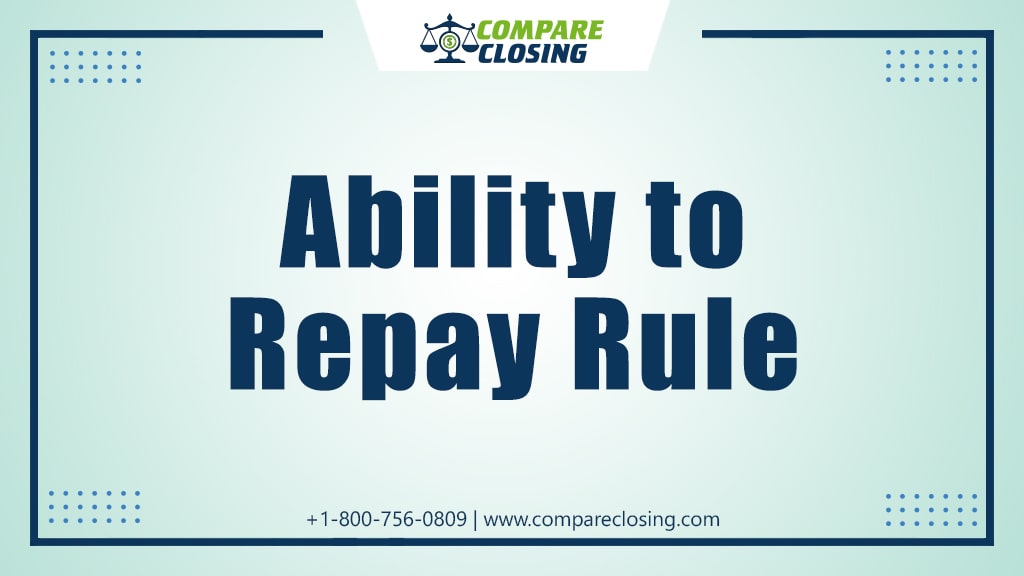Table of Contents
- What Are Netting Escrows & How Does It Work?: The Best Guide - January 2, 2024
- The Secret About Prescriptive Easement: Top Guide 1 Must Know - December 4, 2023
- About Home Equity Loans In Texas And How Can One Obtain It - November 27, 2023
About Ability To Repay Rule
When you are looking for a mortgage you might be possibly shopping around for the best deal with various lenders.
When it comes to qualifying you for a certain program, there are many parameters that a lender has to run through.
The lenders need to basically see if you are capable to repay the mortgage payment by following this parameter which is a part of a process called the ability to repay. In this post, we will know more about the Ability To Repay Rules in detail.
What Is The Ability To-Repay?
Your lender before providing you with the loan will check if you have the financial capability to repay the loan in the event that they default on their mortgage.
When it comes to financial institutions word ability to repay was extensively in the Dodd-Frank Wall Street Reform and Consumer Protection Act of 2010.
It outlines the obligation that the mortgage originating companies provide evidence that the prospective borrowers are able to afford the mortgage that they are offering them.
In the financial industry, this component of Dodd-Frank Regulation is referred to as the “Ability to repay rule” and the phrase ability to repay is abbreviated as ATR.
To implement new rules and regulations in the mortgage business, the Consumer Financial Protection Bureau (CFPB) has given control under Dodd-Frank legislation.
The borrower’s entire current income and any previous debt must be considered by the mortgage loan originators, according to these rules.
The loan originator must ensure that the current debt, as well as any future mortgage debt and associated expenses, does not exceed a certain proportion of the borrower’s gross income as defined by the lender.
History Of The Ability-To-Repay Rule
The ability-to-repay rule was incorporated as a reaction to the home loan situation in 2008. Before then, at that point, banks could give home loans to homebuyers whose wages didn’t exhibit the ability to repay the mortgage installments.
That prompted the housing bubble of the 2000s and the home loan setback. Eventually, countless homes confronted foreclosure simultaneously.
Under the new home loan guidelines specified by the CFPB, people who are not held to the ability to repay standards during the loan origination period might have to face foreclosure.
The ability-to-pay rule is a foundation of monetary stability, as per a paper in The Georgetown Law Journal.
The loan to value ratio alone cannot control the housing bubble. Despite the fact that LTVs are essential to consider as one of the risk constraining parameters, the denominator-the property value will turn out to be misleadingly raised during a housing bubble and will just fall after the bust is in progress, covering the raised default hazard at the beginning and giving false certainty that home loan risk is contained.
The home loan crisis exhibited that the inability to repay intensifies default risk, the paper said, alongside the subsequent further decline in home prices.
Ability To Repay Rule Parameters
The CFPB indicates eight factors that decide if a borrower exhibits the ability to repay.
According to these principles, the mortgage lender is able to make sensible and great confidence choices with regard to the borrower’s ability to repay the mortgage.
The elements used to decide the capacity to reimburse incorporate the borrower’s present income and assets.
The lenders might also consider the borrower’s sensibly anticipated income. The borrower should give verification of this income and their work status.
Other than the borrower’s income, mortgage lenders should think about a borrower’s present liabilities.
That will include any outstanding obligations that the borrower is currently paying, along with child support and other regularly scheduled payments. A bank will also check a borrower’s credit history.
Debt to Income is also one of the factors to be included inability to repay rule. Though this parameter depends on the mortgage programs, your lender still wants to qualify you based on DTI.
Conclusion
With the ability to repay rule, every individual applying for any mortgage loan will have to show how they are going to pay their mortgage payments by providing supporting documents to their lender.
So if you want to get approved for a mortgage and you are unable to show the ability to repay in the case of hardship, the lender won’t be able to proceed with the loan.
Amanda Byford
Amanda Byford has bought and sold many houses in the past fifteen years and is actively managing an income property portfolio consisting of multi-family properties. During the buying and selling of these properties, she has gone through several different mortgage loan transactions. This experience and knowledge have helped her develop an avenue to guide consumers to their best available option by comparing lenders through the Compare Closing business.





